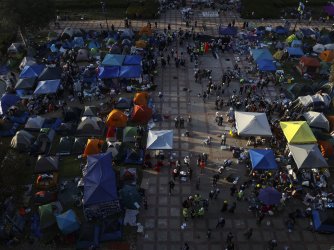Table of Contents
A drag on free expression: Legislatures across the country introduce bills unconstitutionally targeting drag performances
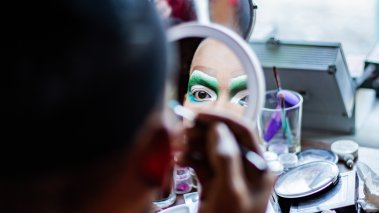
atnadro via Shutterstock
This year, lawmakers in several states, including Arizona, Arkansas, Missouri, Montana, Nebraska, North Dakota, South Carolina, South Dakota, Oklahoma, Tennessee (enacted), Texas, and West Virginia introduced legislation that, if enacted, would impose restrictions on expression taking the form of drag performances.
Drag performances are a protected form of expression with roots at least as old as Shakespearean-era theater, where only men were permitted onstage and thus played both male and female roles.
Even Americans who dislike drag performances should be wary of government officials attempting to legislate against this form of expression, because legislators could just as easily target forms of expression that one does find valuable or enjoyable. As the Supreme Court noted in Cohen v. California, “it is largely because governmental officials cannot make principled distinctions in this area that the Constitution leaves matters of taste and style so largely to the individual.” Indeed, “one man’s vulgarity is another man’s lyric.”
Many bills regulating drag performances unconstitutionally burden, prohibit, or criminalize protected expression. Of particular concern to FIRE are two key ways that some of these bills unconstitutionally restrict expression.
Many bills regulating drag performances unconstitutionally burden, prohibit, or criminalize protected expression.
First are instances in which a bill’s language seeks to regulate all drag performances and to place regulations or prohibitions on such performances, regardless of whether the expression is even sexual in nature. In these iterations of drag bills, some of which have been amended afterwards, the definition of “drag performance” or “drag show” is so broad that it sweeps in performances of Shakespeare, comedy sketches, and other entertainment simply for depicting gender non-conforming characters or characters who are played by actors of the opposite sex.
Second is when proposed laws regulate drag performances that have sexual elements, but do so in a way that regulates gender non-conforming performances differently than gender conforming performances with similar sexual elements. For instance, some bills only require drag shows to appeal to a “prurient interest” before they may be regulated, but gender conforming performances would only be regulated if they include other elements, such as nudity. Prohibiting or adding additional regulations on a performance because the performance is gender non-conforming constitutes unlawful viewpoint discrimination. If those bills targeted instead all performances that “appeal to a prurient interest,” meaning an inordinate interest in sex, regardless of gender conformity, they would still have constitutional hurdles to clear, but they might not violate the First Amendment by engaging in viewpoint-based discrimination.
To explore these two types of restrictions, we will take a closer look at two bills that seek to regulate all drag performances and two bills that regulate drag performances differently than similar gender conforming performances.
Bills regulating all drag performances
Texas
In the current legislative session, Texas legislators introduced several pieces of legislation related to drag performances. One of them, HB 643, would classify businesses that host “drag performances” as a “sexually oriented business.” The bill adds businesses that host a “drag performance” to the definition of “sexually oriented business” in both the Business & Commerce Code and the Local Government Code, meaning local governments can levy additional fees on such establishments and adopt additional ordinances to regulate them. The bill provides the following definition:
“Drag performance” means a performance in which a performer exhibits a gender identity that is different than the performer’s gender assigned at birth using clothing, makeup, or other physical markers and sings, lip syncs, dances, or otherwise performs before an audience for entertainment.
Importantly, the bill’s definition of “drag performance” does not include any mention of “prurient interest” or any reference to sexual imagery. To qualify as a “drag performance,” a performer only needs to do so as a gender identity different from that assigned at birth. This could no doubt sweep in plays, comedy sketches, and other entertainment simply for depicting gender non-conforming characters.
Nebraska
LB 371, as introduced, defines a drag show as follows:
A performance which:
(a) The main aspect of the performance is a performer which exhibits a gender identity that is different than the performer's gender assigned at birth using clothing, makeup, or other physical markers; and
(b) The performer sings, lip syncs, dances, or otherwise performs before an audience for entertainment.
The bill then tightly restricts drag performances as follows:
(2)(a) No individual under nineteen years of age shall be present at a drag show. Any person nineteen years of age or older who knowingly brings an individual under nineteen years of age to a drag show shall be guilty of a Class I misdemeanor.
(b) No individual under twenty-one years of age shall be present at a drag show if alcoholic liquor is being served at such location.
Like the Texas bill, there is no nexus to sexual content in the bill’s language, meaning any venue hosting plays or sketches featuring a gender non-conforming role would be prohibited from hosting any viewer who is under 19 years of age. As FIRE Legislative Counsel John Coleman noted in a hearing regarding the bill last month:
As currently written, the bill’s definition is so broad that it would cover musical versions of ‘Mrs. Doubtfire’ or ‘Tootsie’ as well as traditional Shakespearean performances and other entertainment simply for depicting non-gender-conforming characters or where the characters are played by actors of the opposite sex. Broad definitions, like the one found in this bill, that do not distinguish between protected and unprotected forms of expression are unconstitutional.
Bills regulating drag performances differently than gender conforming performances with similar sexual elements
South Carolina
H. 3616 is an example of a bill which more stringently regulates drag performances than similar gender conforming performances. The bill reads:
(A) Any business where drag shows are held is deemed to be a sexually oriented business for all local ordinances relating to a sexually oriented business. A local government must enforce such ordinances against a business that holds drag shows in the same manner as set forth in the ordinance. [emphasis added]
(B) No minor may attend or view a drag show performance.
(C) For purposes of this section:
(1) “Drag show” means a performance in which a performer exhibits a gender identity that is different than the performer’s gender assigned at birth using clothing, makeup, or other physical markers and sings, lip syncs, dances, or otherwise performs before an audience for entertainment, and is intended to provide sexual stimulation or sexual gratification which are distinguished or characterized by an emphasis on matter depicting, describing, or relating to nudity or state of nudity, seminudity or state of seminudity, specific sexual acts, or specific anatomical areas.
In this bill, the definition of “drag show” includes sexual elements such as “nudity or state of nudity” and “specific anatomical areas.” While there may be problems with certain aspects of the definition in terms of vagueness and overbreadth, it is comparable in many respects to the definition of sexually oriented businesses. However, if one looks closer at this legislation, it becomes clear it targets expression on the basis of viewpoint.
The bill requires localities with ordinances related to sexually oriented businesses to apply those ordinances to these sexualized “drag shows.” However, neither this legislation nor the underlying statute treat similar gender conforming performances the same way. In other words, if a performance is “intended to provide sexual stimulation or sexual gratification which are distinguished or characterized by an emphasis on matter depicting, describing, or relating to nudity or state of nudity, seminudity or state of seminudity, specific sexual acts, or specific anatomical areas,” but features performers who exhibit a gender identity in conformance with the performer’s “gender assigned at birth,” minors would not be prohibited from attending the performance. Further, local ordinances regulating sexually oriented businesses would not be required to apply to such performances.
Minnesota
HF 1903 is a bill that likewise treats sexualized gender non-conforming performances differently than gender conforming performances. The bill categorizes any business that is (1) only open to adults and (2) presents “live drag performance” as an “adult entertainment establishment” subject to existing laws pertaining to such establishments.
“Live drag performances” are defined as those:
(i) in which one or more performers:
(A) exhibits a gender identity that is different from the performer’s gender assigned at birth using clothing, makeup, or other accessories that are traditionally worn by members of and are meant to exaggerate the gender identity of the performer's opposite sex; and
(B) sings, lip-synchs, dances, or otherwise performs before an audience of at least two persons for entertainment, whether performed for payment or not; and
(ii) that is intended to appeal to the prurient interest;
To be clear, the statute this bill would amend regulates businesses that host sexual gender conforming performances as well. Specifically, the current statute regulates businesses that only admit adults and present “(i) live performances that are distinguished or characterized by an emphasis on the depiction of sexual conduct or nudity . . . .” The statute does not have language concerning gender conformity and would treat both sexualized performances, drag or otherwise, that have “sexual conduct or nudity” the same.
However, this bill would capture additional performances in a viewpoint-discriminatory way. While the statute applies to businesses hosting performances with “sexual conduct or nudity,” this bill would change the statutory trigger for certain businesses that host drag performances. Drag performances would only have to appeal to the “prurient interest” before the statute became applicable, even if the performance did not have “sexual conduct or nudity” as defined in Minnesota law. In contrast, a performance with gender conforming performers that appealed to the prurient interest but did not have “sexual conduct or nudity” would escape unregulated.
In sum
Overall, legislation regulating sexual performances or businesses that host them may have constitutional flaws. While these flaws are no doubt concerning to FIRE, bills pertaining to drag performances that present either of the two issues highlighted above are of greatest concern to us.
A vast majority of drag performances are constitutionally protected like other kinds of theatrical performances. As FIRE attorney Adam Steinbaugh recently put it, “Drag is a form of speech, it is a form of expression.” He added, “Some people might find it offensive. The solution to that is: Don’t go. If it’s not your cup of tea, don’t drink it.”
It’s also important to note that states typically already have laws on the books to address obscene material. As a recent federal court wrote in an temporary restraining order halting a Tennessee law with provisions related to drag performances: “[C]urrent obscenity laws already account for much of the conduct that the Statute seeks to punish.”
FIRE urges lawmakers to consider the pitfalls discussed to prevent crossing these unconstitutional lines. We will continue to monitor these types of bills and will keep readers informed of important updates.
Recent Articles
FIRE’s award-winning Newsdesk covers the free speech news you need to stay informed.
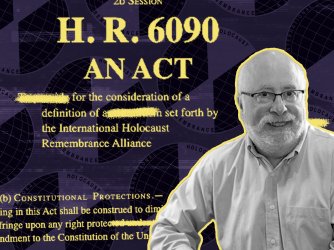
The Antisemitism Awareness Act
On May 1, the U.S. House of Representatives passed the Antisemitism Awareness Act by a vote of 320 to 91. Proponents of the law say it is necessary to address anti-Semitic discrimination on college campuses. Opponents argue it threatens free speech....
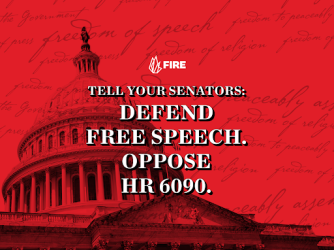
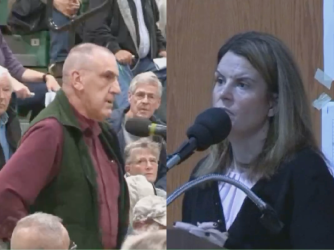
Massachusetts town stifles ‘disparaging’ comments at town hall meeting concerning phony overtime billing
